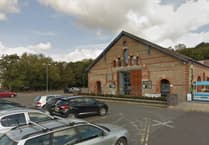WORK to help keep Bath and North East Somerset Council’s highway network moving during the winter is complete with stocks of road salt, grit bins and gritting lorries prepared.
Almost 2,000 tonnes of road salt are already in dry storage in the council’s two salt barns and work to check and refill the 434 grit bins across the district is underway.
The spreading of road salt significantly helps prevent ice forming on road surfaces and makes them safer for road users in the winter months.
A dry gritting run took place making sure the council’s nine gritting lorries were ready and working after their summer services. The council has split its gritting fleet this year for the first time and will operate three gritting lorries from the Keynsham Recycling Hub, providing quicker access to gritting routes nearby and increasing the council’s efficiency and operational resilience.
On average the council carries out 57 gritting runs each year, using around 2,500 tonnes of road salt as it maintains 1,102km of highway. Each gritting run sees gritting vehicles deployed to prioritised highways like A roads, B roads, bus routes and roads which provide access to schools and hospitals.
You can see a map of the council’s gritting routes and grit bin locations here: https://www.bathnes.gov.uk/webforms/maps/?center=51.35253199944113,-2.4480888658019277&zoom=12&map=highwaysandtravel&base=Ordnance%20Survey&categories=highwaysandtravel_gritting&wfslayers=mlyr-804010,mlyr-804033
Councillor Manda Rigby, cabinet member for highways, said: “Preparations for the colder days and nights are already in hand, as ever our Highways team will provide a 24/7 service keeping our road network safe and running.”
The council will use the colder months to focus on maintaining the highway and undertaking reactive works like pothole repairs, gully cleansing and gritting. Highway patching and resurfacing works pause until the warmer, drier and more suitable weather of spring.
As temperatures drop, the Highways team will closely monitor specialist forecasts and data from its own weather stations to identify when low temperatures and weather conditions pose a threat to road users. Gritting runs are needed whenever road temperatures near freezing. There are 18 specially trained drivers on stand-by to respond when required.
If there is an empty grit bin in your area it can be reported through: https://tracking.vuelio.co.uk/tracking/click?d=6XA_jyncQWY5rwrSRPslUs644cuaWicJhcoA-Hmivgp1PGFuYx3_fhSVDwRUO4KoRvt09ZbW72GT9YNWvgjdrYW8c5YRnJXxzOUu5Wm1p9HYlZMWIbH521rEQudB5DICU9_h1UWIkEzFL0xUg81Zm3I1





Comments
This article has no comments yet. Be the first to leave a comment.